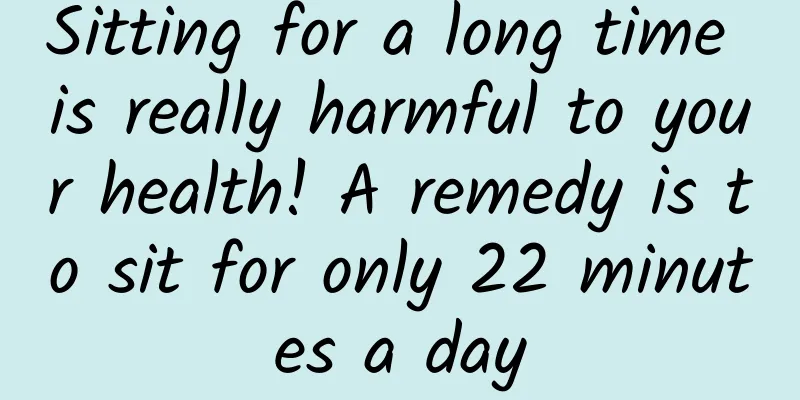Sitting for a long time is really harmful to your health! A remedy is to sit for only 22 minutes a day

|
Sitting for a long time has become a normal part of many people's work and life. They take the bus when going out, sit in front of the computer all day long in the office, attend meetings, and lie down when they get home... However, prolonged sitting is associated with a variety of diseases and an increased risk of death. Frequent sitting can lead to obesity, cervical spondylosis, constipation, high blood pressure, diabetes, cancer, etc. (Click here to learn about the harm of prolonged sitting → Sitting for a long time can cause 7 harms to the body!) However, many people sit for long periods of time every day because of work requirements or necessity. So how can we reduce the harm of sitting for long periods of time? Image source: Health Times The best remedy for long periods of sitting is revealed: 22 minutes of this kind of exercise every day Recently, a study published in the British Journal of Sports Medicine found that people who sit for more than 12 hours a day can offset the increased risk of death by doing 22 minutes or more of "moderate to high intensity exercise" per day compared to 8 hours! And no matter how long you sit, as long as you move, it is associated with a lower risk of death. This can be said to be the best remedy for sitting for too long! The study included about 12,000 people and found that regardless of the length of time spent sitting, more "moderate to high intensity exercise" can reduce the risk of death. If "moderate to high intensity exercise" is ≥ 22 minutes, there is no significant difference in the risk of death between those who sit for 8 hours a day and those who sit for 12 hours a day. This means that at least 22 minutes of moderate to high intensity physical activity a day can offset the increased risk of death from sitting for a long time. This can be said to be the "best remedy" for people who sit for long periods of time to reduce the risk of death. Which exercises are considered “moderate to high intensity exercises”? According to the World Health Organization, adults should do 300 minutes of moderate-intensity aerobic exercise per week, or more than 150 minutes of high-intensity aerobic exercise; or a combination of equal amounts of moderate-intensity and vigorous-intensity exercise, which is better for health! How to judge mild, moderate and high-intensity exercise? The World Health Organization once explained that mild physical activity refers to activities such as slow walking that do not significantly increase our heart rate, breathing rate, etc., while moderate and high-intensity physical activities will bring about obvious changes in heart rate. 1. Low-intensity exercise. During low-intensity exercise, the heart rate is maintained at about 100 beats per minute, and the body feels slightly warm. For example, walking, walking the dog, doing housework, etc. are all low-intensity exercises. 2. Moderate-intensity exercise. Moderate-intensity exercise means that the heart rate is 100 to 140 beats per minute. During the exercise, you can feel sweating, your breathing is relatively rapid, and you feel a little strenuous. For example: brisk walking, jogging, cycling, swimming, yoga, etc. 3. High-intensity exercise. High-intensity exercise means that the heart rate is greater than 140 beats per minute. At this time, you will sweat profusely, your heart rate will be violent, you will be panting, and you will feel out of breath. For example: fast running, high-speed cycling, fast high leg raises, deep squats and jumping jacks, HIIT (high-intensity interval training), etc. How to increase the amount of “medium to high intensity” exercise every day? Many people are very busy every day. How can they increase their daily “medium to high intensity” exercise? 1. Climb the stairs In daily work and life, many people are used to taking the elevator. It is recommended that you adjust your habit of taking the elevator to go upstairs and change to climbing stairs. Climbing stairs is a medium-to-high intensity training. If you have to climb more than ten flights of stairs every day when you go to work and go home, you can greatly increase the amount of "medium-to-high intensity" exercise every day. 2. Walk fast If the commute distance is short (within 5 kilometers), it is recommended that you change from taking a car to walking quickly. Pay attention to your heart rate and pace while walking. A speed of 130 to 140 steps per minute is appropriate, and the heart rate should be controlled within the moderate-intensity exercise range of 100 to 140 beats per minute. 3. Cycling If your commute is a little far (5-10 kilometers), you can try fast cycling. Fast cycling is also a medium-to-high intensity exercise that can effectively exercise our largest muscle group - the thigh muscles. Image source: Jinpeng Remember these 5 points before medium-to-high-intensity exercise 1. Warm up thoroughly before exercise Be sure to warm up thoroughly before exercise to avoid sports injuries. Stretch and relax your muscles after exercise. If you have recently felt unwell, have a cold, fever, chest pain, difficulty breathing, dizziness, headache, joint discomfort, etc., avoid medium to high intensity exercise. 2. Exercise gradually Exercise should be done gradually and within one's ability. Don't be too eager to exercise. Especially for those who don't usually exercise, it is best not to do sudden and intense exercise, which is easy to cause sports injuries. Especially for those who are obese or have joint diseases, they should be wary of excessive exercise that may cause damage to the body. 3. Stop if you feel uncomfortable during exercise If you feel uncomfortable during exercise, stop immediately. "Sport-related sudden death is more likely to occur when exercising after an injury, illness, poor health, overwork, lack of sleep, or a cold or fever." Hu Xitian, chief physician of the Fourth Department of Cardiovascular Medicine at Shijiazhuang First Hospital, reminded in an interview with Hebei News Network in 2016 that if you are very tired recently, it is best to reduce strenuous exercise. If you feel chest tightness, lack of oxygen, dizziness, or radiating pain in the back, you should stop exercising immediately and go to the hospital for examination. 4. Cool down after exercise The sudden stop after strenuous exercise is equivalent to "brake emergency", so you need to do a "cool down exercise" after exercise. Liu Peizhong, deputy chief physician of the Department of Cardiovascular Medicine of Zhuhai Hospital of Guangdong Provincial Hospital of Traditional Chinese Medicine, published an article in Health Times in 2019, saying that cool down exercises can slow down the rapid heartbeat to a safe level, accelerate the excretion of metabolic products such as lactic acid, relax muscles, eliminate fatigue as soon as possible, promote physical recovery, and reduce muscle soreness after exercise. Jogging, brisk walking, stretching and relaxation after moderate to high intensity exercise can maintain and promote blood circulation. In the cool-down exercise, gradually slow down the movements and reduce the heart rate to below 120 beats/minute, which generally takes 5 to 10 minutes. Image source: Health Times 5. Don’t drink too much after exercise After exercise, many people feel dry mouth and want to drink a lot of water quickly. At this time, it is recommended to calm the body first, drink water in small sips multiple times, and do not drink in large gulps. Tao Ling, director of the Department of Cardiology at the Second People's Hospital of Lanzhou City, Gansu Province, said in an interview with Runliu News in 2022, "Because water accumulates in the gastrointestinal tract in a short period of time, in addition to feeling heavy and bloated in the stomach, it will also affect the activity of the diaphragm, and then affect normal breathing. A large amount of water entering the blood will also rapidly increase blood volume, suddenly increase the burden on the heart, and lead to abnormal cardiopulmonary function." References [1]Sagelv EH, Hopstock LA, Morseth B, et al. Device-measured physical activity, sedentary time, and risk of all-cause mortality: an individual participant data analysis of four prospective cohort studies[J]. British Journal of Sports Medicine, 2023. [2] 2021-04-20 World Health Organization "Does exercise also have high, medium, and low intensity? Do you understand the WHO's recommendations?" [3] 2016-03-03 Hebei News Network, “Why does exercise kill people? — Experts reveal the truth about sudden death during exercise” [4] 2019-03-15 Health Times "Do a cool-down exercise after exercise" [5] 2022-10-10 Benliu News: "Does high-intensity exercise increase the risk of sudden death? Listen to your doctor's advice" Planning and production Source: Health Times Reviewer: Tang Qin, Director and Researcher of the Science Popularization Department of the Chinese Medical Association Editor: Yinuo |
<<: Winter is coming! Are your children sleeping well while they are busy with their final exams?
>>: What exactly are the green vegetables that people in the South refer to?
Recommend
A complete guide to the 2019 Tik Tok promotion plan, everything you want to know is here!
While TikTok is reaping the benefits, everyone wa...
Write quality code that others can understand
[[150631]] With the continuous development of the...
Coal shortage: is nuclear heating the answer?
Zhejiang Haiyan and Shandong Haiyang have complet...
New Bug Exposed in iOS 10.2: Say Goodbye to the Era of CDs?
According to a report by Cult of Mac, iOS 10.2 do...
The process of placing Kuaishou information flow ads!
On Kuaishou, users can use photos and short video...
Why can't we feel the earth spinning?
Regarding rotation, it's not that simple. By ...
No. 1 on the "dirtiest fruits and vegetables list"! Is it still edible to eat this fruit that is on the market in winter?
Winter is the season for sweet strawberries. Have...
As coders, why do we write?
[[144679]] In the programmer industry, there are ...
Is Maiqiu'er's explanation of the residue reliable?
In response to the milk quality issue that has at...
"Marriage first, love later", she is the goddess of the ancient fish kingdom, making the "devil fish" a sensation around the world
There has never been a lack of great women on the...
The video account operates the book list project, which can be easily monetized later and you can make money without doing anything.
The video account operates the book list project,...
Fuyang SEO training: How to quickly optimize website rankings
1. Website optimization user search habits Whethe...
Dong Mingzhu "debates" with post-90s: I haven't heard of them being dissatisfied with the startup photos
You thought it was an oil painting, but it was ac...
A perfect event planning plan cannot be without these elements!
Do you hope that the event will become a hit? Tha...
2016 Apple App Store Japan Annual Game List
Today, Apple released the 2016 game list for Japa...









